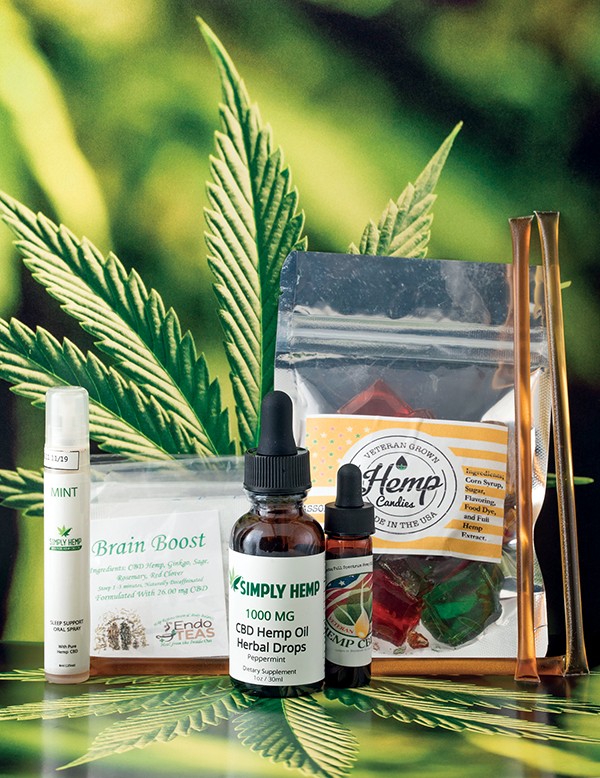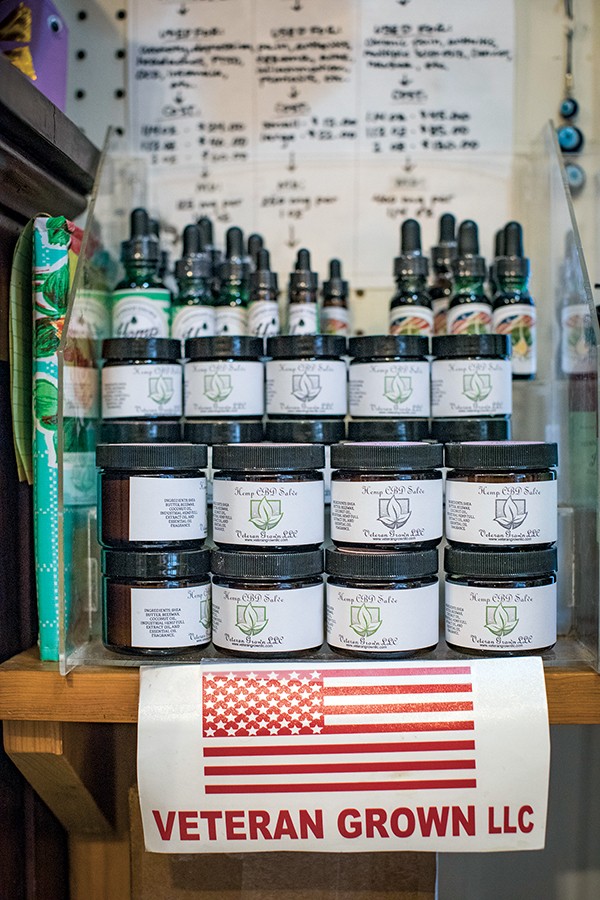The Bust
In February 2018, 23 businesses in Rutherford County were raided by police. Operation Candy Crush came about when Rutherford County District Attorney General Jennings H. Jones acted on reports that stores in the area were selling marijuana-laced candies. Stores were shuttered, 21 people were indicted, and Jones held a triumphal press conference to let his constituents know that he was protecting the community against drug pushers.
But there was a problem with Operation Candy Crush. The products in question were derived from cannabis sativa, but they had no intoxicating effects. The gummies contained cannabidiol (CBD), but not tetrahydrocannabinol (THC).
A few months before the raid, in May 2017, the Tennessee legislature had unanimously approved a measure legalizing the cultivation of industrial hemp in the state. The bill included a provision that allowed the sale of hemp-derived products containing less than 0.3 percent THC without a prescription, as long as the products are tested and clearly labeled.
“General Jones could not be more misguided in his attempt to interpret the law. He is completely mistaken, perhaps intentionally so,” Joe Kirkpatrick, president of the Tennessee Hemp Industries Association told the Murfreesboro Voice.
By March, all charges brought by Operation Candy Crush had been dropped, the stores reopened, and their confiscated cash returned. CBD was now unquestionably legal in Tennessee.
The Boom
For the past three years, Memphians Paula Robinson and her business partner, Tracy DuMars, have run a successful mail-order store through the online retailer Amazon. Last year, they were contacted by producers of CBD products asking them to consider selling oils, salves, candies, and sprays. At first, Robinson says she was hesitant. “You always get nervous because of state laws and the federal government. But everybody in the industry was talking about how CBD was legal in all 50 states. It settled our minds.”
Robinson and DuMars attended a “Hemp Summit,” where experts and early adopters in the burgeoning field of medicinal cannabinoids pitched their wares. “Everybody got up on stage and did their presentation, with their research and how long they had been in business,” says Robinson.
The pair were impressed with what they heard. “We decided instead of selling other people’s products, we would sell our own.”

They partnered with a skin-care products manufacturer who was eager to get into the CBD business and created Simply Hemp oils, oral sprays, teas, and even honey sticks infused with cannabidiol. But there was a problem: You can’t sell CBD on Amazon, because as far as the federal government is concerned, it’s still a Schedule 1 controlled substance.
“But that’s about to change,” says Robinson. “The Senate just passed the 2018 Farm Bill, that Mitch McConnell is a big player in. It will be in a separate category from marijuana: CBD from industrial hemp. It will be completely legal in the eyes of the federal government.”
Robinson and DuMars lacked a brick-and-mortar store, but started selling their products by mail and at fairs and flea markets. They found rapidly growing demand. “Since our first festival in April, we are getting repeat customers from everywhere we’ve gone,” DuMars says. “We have a lot of repeat customers for the sleep spray.”
Maggie’s Pharm has been selling dietary supplements and herbal remedies in Overton Square since 1979. Manager Sue Jordan says, earlier this year, they were contacted by Veteran Grown, a Clarksville, Tennessee, industrial hemp operation. “At first we were like, ‘Is this stuff legal?'” she recalls.

Sue Jordan (left) and Bella Golightly with CBD gummies, oils, and other products at Maggie’s Pharm in Midtown.
Bella Golightly, who works behind the counter at Maggie’s Pharm, knew there was pent-up demand for CBD. “So many people were asking for it before we even had it.”
Now, the CBD tincture, extract, sprays, and candies are flying off the shelves. Their restocking orders went from monthly to weekly. “It was pretty much instantaneous,” says Jordan.
What’s It For?
When I asked Facebookers for their experiences with CBD, I was inundated with testimonials. “I’m getting eye injections for Diabetic Retinopathy,” says Mitch McCracken. “I also have problems with Peripheral Neuropathy, which is nerve pain in my feet. Rest assured that since being diagnosed [with diabetes] in 2003, I have done a lot of research on how to live longer.”
For 15 years, McCracken’s diabetes has caused burning sensations in his feet at night and numbness during the day. “I take medication for it, but the pain and burning are still always there. That is, until recently. I no longer have to sleep with my feet sticking out from under the covers. No burning at night, no more numbness. What’s going on? My blood sugar readings are lower, my cholesterol is better, and so is my blood pressure. AND when I’m on Facebook and I read something I don’t like, I don’t feel the need to respond! The only difference is taking drops of CBD oil twice a day.”
Katherine Dohan has also seen great therapeutic effects from CBD. “I’m pretty obsessed with it,” she says. “It helps my pain and anxiety. It’s been a game-changer for me. I take several drops every night of CBD oil, and I’ve been vaping organic CBD throughout the day. An herbalist told me that you need to build it up in your system and keep dosing every six to eight hours for pain and inflammation. So I’ve been vaping it when I feel like it throughout the day — pretty often to be honest — and then talking three to five drops before I go to sleep.
Ally Aycock was one of several people who have found veterinary uses for CBD. “My dog is allergic to everything,” she says. “After six steroid shots in three years, I worried about the risk of long-term issues. I paid for allergy panels and put him on an allergy shot regimen. His condition did not improve. I changed his diet — and now give him CBD oil. The transformation has been amazing. No hives. No skin infections. No steroid shots.”

Sue Jordan became a CBD believer soon after Maggie’s Pharm started carrying the products. She says she uses it to treat pain from her temporomandibular joint disorder (TMJ). “I take about a dropper full of extract a day. If I don’t take it, I can tell. I’m not taking Advil or naproxin or anything.”
One respondent, BL, who asked that her real name not be revealed, used CBD salves to replace opioid pain medications after having foot surgery to repair broken bones, ripped tendons, and accumulated scar tissue. “I had taken a fair share of pain meds until my friends bought me some balms/creams that I could rub on the hurt area, which would allow me to sleep,” BL says. “I also used CBD in combination with THC in the form of edibles to help with sleep and anxiety, so I simultaneously got off all pain meds and anxiety meds. Opiates make me feel high and drowsy, but also make me sleepless and have nightmares. CBD has no real side effects at all.”
BL says she now works in the field of addiction recovery. “The mind is a tricky thing. I would say that CBD does not pose relapse issues with recovering addicts. I might not recommend it for the first year or two of recovery, like many things. But, I think a lot of relapsing happens from methods not agents. Like all users of CBD, the recovering person should be educated about the product — its chemical make-up; how it is a non-narcotic, etc. I would not recommend vaping CBD to a person who has just quit smoking. I’d recommend a tincture instead.”
The Science
Is this all too good to be true? A growing body of research supports the anecdotal claims.
The cannabis sativa plant naturally produces more than 100 closely related compounds known as cannabinoids. For decades, black market marijuana growers have bred strains of the plant that concentrated a single cannabinoid, known as Delta-9-THC, in the unfertilized flowers or buds of the female plant. But in the process of optimizing their product for euphoric potential, they also discovered that different cannabinoids expressed in the plants could cause vastly different effects when ingested by humans. Cannabis had been used in traditional herbal remedies for millennia, but until recently there had never been a serious study of the chemistry involved. As cannabis has become legal in various states, more science was applied to the question, and CBD has emerged as the most interesting group of compounds.
“The CBD does not react with the same receptors as THC, and therefore does not produce the psychotropic effects associated with cannabis,” says Lindsey Carr of Midtown Chiropractic.

Lindsey Carr
Carr says her practice has been offering CBD products for about 10 months. “I started to carry them for my chronic pain patients due to their anti-inflammatory properties. … CBD acts on the endocannabinoid system. This system plays a role in many of our necessary functions, including mood, memory, pain regulation, and cognitive processes.”
Carr says the feedback has been very positive. “My patients have found CBD to be effective in relieving both pain and anxiety symptoms. I do not use CDB on a regular basis, but rather utilize it more as a ‘spot check’ if I am experiencing anxiety or inflammation. My senior Great Dane, Doc Holiday, is a daily CBD user. It has helped him recover from major bowel surgery and has helped to manage his arthritis.”
As a physician, Bradley Postlethwaite knows a thing or two about arthritis. “As a rheumatologist, I would like to see more clinical trials evaluating the potential of CBD for control of pain and inflammation,” he says. “More and more patients are inquiring about it for these indications. Preclinical studies and anecdotal accounts by a growing patient population suggest that CBD could have potential as an anti-inflammatory and analgesic agent.”
Postlethwaite says he has not been directly involved in any research, but first became interested in the chemical’s potential about eight years ago. “CBD is interesting for many reasons. It is a non-psychoactive cannabinoid, has a good safety profile, has unique pharmacologic properties, and possibly a broad range of therapeutic applications, based on both pre-clinical research and human clinical trials. It was the first (and currently only) plant-derived cannabinoid to be evaluated in randomized controlled trials. More importantly, it was approved by the FDA for treatment of rare, severe forms of epilepsy. This makes CBD the first cannabis-derived compound to win FDA approval — and even more interestingly, the only Schedule I substance to ever be FDA-approved for treatment of human disease.”
In 2017, doctors Kerstin Iffland and Franjo Grotenhermen published an extensive review of the existing body of research in the journal Cannabis and Cannabinoid Research. They compiled all existing data on CBD’s physiological, neurological, neuropsychiatric, glycemic, endocrine, and toxicity and mutagenicity effects.
“In general, the often-described favorable safety profile of CBD in humans was confirmed and extended by the reviewed research,” the report concluded. “The majority of studies were performed for treatment of epilepsy and psychotic disorders. Here, the most commonly reported side effects were tiredness, diarrhea, and changes of appetite/weight. In comparison with other drugs used for treatment of these medical conditions, CBD has a better side-effect profile. This could improve patients’ compliance and adherence to treatment.”
Postlethwaite says CBD research is still in its infancy, but already there are tantalizing hints of deeper benefits. “The absolutely most interesting aspect of CBD is its potential as a tool in the treatment of a variety of cancers. A great deal of preclinical research suggests CBD may help slow growth of certain types of tumors and also decrease aggressiveness/metastatic potential in a variety of cancers.”
A 2006 UCLA study led by pulmonologist Donald Tashkin delved into the connection between marijuana and cancer. With more than 2,000 participants, it was the largest study of its kind ever conducted. “We hypothesized that there would be a positive association between marijuana use and lung cancer, and that the association would be more positive with heavier use,” Dr. Tashkin told the Washington Post. “What we found instead was no association at all, and even a suggestion of some protective effect.”
By contrast, the same study found that subjects who smoked two packs of cigarettes a day increased their chances of lung cancer by 20 times. The findings have been controversial for years, but now appear to support the hypothesis that CBD in marijuana has an anti-cancer effect.
Postlethwaite cites a recent study on the effects of CBD for patients with aggressive brain tumors. “The findings of this clinical trial along with all of the aforementioned preclinical data seem to suggest that CBD may have a role in the actual treatment of cancer, not just alleviation of symptoms and pain. While CBD may not turn out to have the same potency as other anti-cancer agents when used as a stand-alone therapy, it certainly has a better safety profile than most drugs used in oncology, and thus could be a powerful add-on therapy.”
He emphasizes that this is very much an open field of study. “It’s crucial for cancer patients interested in trying CBD or any cannabis-based treatment to involve their oncologist in the process.”
What to Know
In the last 12 months, there has been a major proliferation of CBD products. As with any new product, consumers should beware. “Some of these companies — it’s hard to know how many — may misrepresent the dosage or content of CBD in their products,” says Postlethwaite. “Several came under fire from FDA after their supplements were tested and found to contain no CBD at all.”
Proper dosages have not yet been established, except for anti-seizure and epileptic applications. “Randomized trials are needed to determine effectiveness and recommended dose for treatment of arthritis and pain in humans, but if you extrapolate the data from preclinical studies, the average 70 kg human would seem to need a minimum dose of around 400 mg daily to have an effect on arthritis pain. Recommendations on dosing are usually included with these products and generally translate to less than 100 mg daily. Assuming CBD works as an anti-inflammatory or analgesic agent in humans, the effective dose is likely higher than what most individuals are taking.”
But while CBD is exceptionally non-toxic, as far as drugs go, the same can’t be said for any additives in the various over-the-counter CBD products in stores now. Users should research the manufacturers and be wary of additives.
“You want to know where the hemp is grown and whether or not it is organic,” says Paula Robinson of Simply Hemp.
A “full spectrum” product contains several different cannabanoids, while an “isolate” contains just a single cannabanoid isolated for a particular effect. Most of these claims have not been evaluated by the FDA, so users should be cautious while finding the ones that work for them.
“There are no official guidelines yet,” says Robinson. “Everyone’s body is different, everyone’s needs are different. … We don’t just want to give people the product and send them on their way. We want to educate people.”